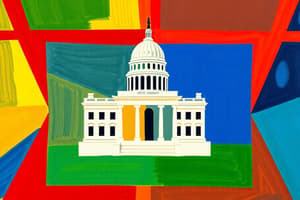Podcast
Questions and Answers
What is an example of a unitary government?
What is an example of a unitary government?
Great Britain before the American Revolution and France currently.
What article and section of the Constitution is the Privileges and Immunities Clause found in?
What article and section of the Constitution is the Privileges and Immunities Clause found in?
Article IV, Section 2.
What does the Privileges and Immunities Clause guarantee?
What does the Privileges and Immunities Clause guarantee?
It guarantees that citizens of each state are afforded the same rights as citizens of all other states.
What does the 10th Amendment assert?
What does the 10th Amendment assert?
What are reserved powers?
What are reserved powers?
What are concurrent powers?
What are concurrent powers?
What is an example of a concurrent power?
What is an example of a concurrent power?
What is the Full Faith and Credit Clause?
What is the Full Faith and Credit Clause?
What was the significance of McCulloch v. Maryland?
What was the significance of McCulloch v. Maryland?
What did Gibbons v. Ogden establish?
What did Gibbons v. Ogden establish?
What is the Commerce Clause?
What is the Commerce Clause?
What is dual federalism?
What is dual federalism?
What was the outcome of NLRB v. Jones and Laughlin Steel Co.?
What was the outcome of NLRB v. Jones and Laughlin Steel Co.?
What is cooperative federalism?
What is cooperative federalism?
What are categorical grants?
What are categorical grants?
What was the Great Society's purpose?
What was the Great Society's purpose?
What is the significance of the Great Society?
What is the significance of the Great Society?
What is New Federalism?
What is New Federalism?
What is a block grant?
What is a block grant?
What is devolution?
What is devolution?
What are unfunded mandates?
What are unfunded mandates?
What are examples of unfunded mandates?
What are examples of unfunded mandates?
What is the purpose of the No Child Left Behind Act?
What is the purpose of the No Child Left Behind Act?
What is preemption?
What is preemption?
What is the significance of Webster v. Reproductive Services?
What is the significance of Webster v. Reproductive Services?
Flashcards are hidden until you start studying
Study Notes
Government Structures and Clauses
- Unitary Government Example: Great Britain before the American Revolution, France currently.
- Privileges and Immunities Clause: Found in Article IV, Section 2 of the Constitution; ensures that citizens of each state have the same rights as those in other states.
Amendments and Powers
- 10th Amendment: Powers not granted to the national government or prohibited to states are reserved for the states.
- Reserved Powers: Authority exclusive to state governments.
- Concurrent Powers: Powers shared by both national and state governments, including taxation, borrowing money, establishing courts, and enforcing laws.
Key Constitutional Clauses and Court Cases
- Full Faith and Credit Clause: Part of Article IV ensuring that judicial decisions and contracts in one state are enforceable in others.
- McCulloch v. Maryland: Supreme Court ruling that affirmed the national government's authority and the broad interpretation of the Necessary and Proper Clause, establishing expansive federal powers.
- Gibbons v. Ogden: A landmark Supreme Court case reinforcing the Commerce Clause, which grants Congress the power to regulate interstate commerce.
Federalism Concepts
- Commerce Clause: Article I, Section 8 of the Constitution; grants Congress the power to regulate commerce; broadly interpreted in cases like Gibbons v. Ogden but restricted in Lopez & Morrison.
- Dual Federalism: Concept favoring clearly defined separate powers for national and state governments.
- Cooperative Federalism: Evolved from the New Deal, emphasizes collaborative interactions between national and state governments.
Legislative Actions and Grants
- Categorical Grants: Federal funds appropriated by Congress for specific purposes.
- Block Grants: National laws directing state compliance with federal regulations without dedicated federal funding.
- Unfunded Mandates: Federal requirements imposed on states without financial support; example includes clean air or water standards.
Social Programs and Policies
- Great Society Initiatives: Aimed to combat poverty and discrimination while altering the federal-state power dynamic.
- New Federalism: Proposed during the Reagan administration to return administrative power to states.
- No Child Left Behind Act: Established to enhance educational standards, accountability, qualified teachers, and bridge the achievement gap.
Judicial Precedents and Changes
- NLRB v. Jones and Laughlin Steel Co.: Secured the National Labor Relations Board's authority to enforce labor laws, reinforcing federal power.
- Preemption: Derives from the supremacy clause allowing the federal government to override state actions in specific areas.
- Webster v. Reproductive Services: A case prompting states to adopt new restrictions on reproductive rights.
Studying That Suits You
Use AI to generate personalized quizzes and flashcards to suit your learning preferences.




